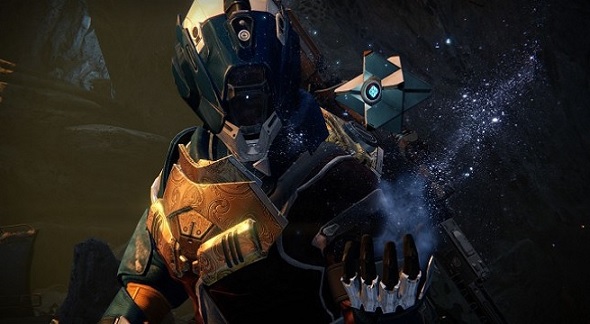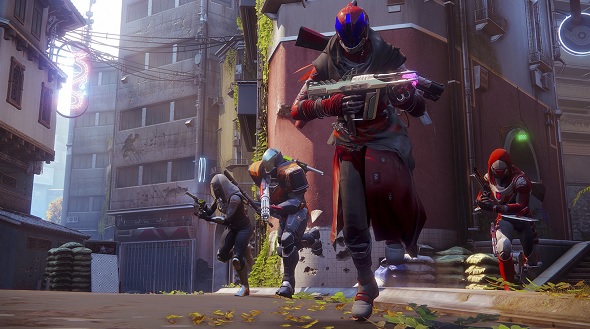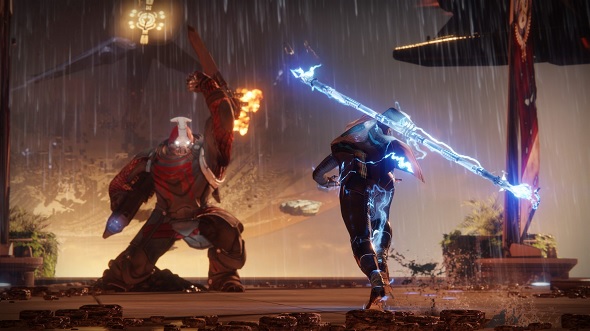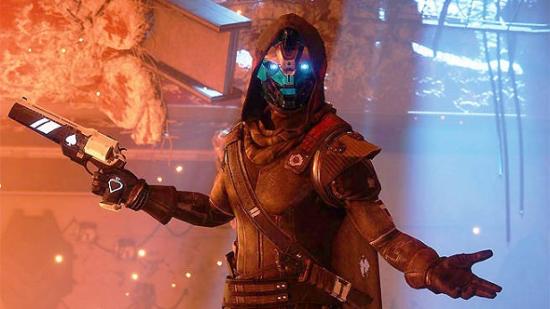While Destiny 2 boasts an absolutely beautiful soundtrack, and punctuates it with some of the most satisfying gun sounds in gaming, there is still one way the game falls eerily silent: you. In such a grandiose game where you, the protagonist, are an integral piece woven into the story’s tapestry, why do you feel like a bystander that has been unceremoniously muted? Spoilers ahead, ye be warned.
After larger impressions of Destiny 2? You’ll want to check out our Destiny 2 PC review.
You are, at least, accompanied by your small yet dependable Ghost – given life by Nolan North’s charismatic tones. Originally voiced by everyone’s favourite drunken Lannister, Peter Dinklage, in the original game, it is fair to say the reception to the voice acting was less than stellar, and led to several of the Ghost’s unpolished lines of delivery being meme-ified online (I won’t repeat them here for the sake of everyone’s sanity). From The Taken King expansion onwards he was replaced, with the king of VO himself taking the reins. An effort to surface the game’s lore saw North’s Ghost chatting a great deal more during the game’s interactions and cutscenes. This seems to have increased tenfold in Destiny 2, even as your Guardian remains firmly tongue-tied.

North’s Ghost could have been an adequate solution to your character’s lack of words had developers Bungie implemented him accordingly. As it stands, however, Destiny’s NPCs still greet you personally, but it is your Ghost who responds – apparently trying to fill a potentially awkward silence on the assumption that you will not reply. This leads to interactions that make you feel like you are awkwardly third-wheeling on someone else’s conversation. These small in-game interactions should serve to build the world around you and create a bond with the characters you work alongside, but instead it feels like you are listening to a one-sided phone call. Despite the story revolving around your Guardian, your lack of responses results in the majority of dialogue addressed to you feeling hollow and wholly impersonal.
Speaking of NPCs, with such a rich cast of superb voice actors – from show-stealing Nathan Fillion, to the likes of Lance Reddick, Gina Torres, and VO veterans Gideon Emery and Claudia Black – it is a damn shame that we simply cannot interact with them in any way. Short exchanges with these characters as you complete patrols and strikes could have been a key way for Bungie to flesh out your relationships with the motley crew that makes up the supporting cast, and the worlds that surround them, giving us a chance to build the level of intimacy expected from a game with such heavy RPG leanings. Honestly, I just really want to be able to chat to Devrim Kay about what tea he is into as I am having a mosey around the European Dead Zone.

Your silence is felt most during key points in Destiny 2’s story arc. In the game’s opening mission, ‘Homecoming’, you watch as The City, the last bastion for mankind and – if you played the first Destiny – your home of three years, is reduced to little more than fire and rubble. As if that wasn’t already a terrible turn of events, the source of your Guardian superpowers, the Light, is siphoned from you as Destiny 2’s big bad villain, Ghaul, kicks you six ways from Sunday. What do you have to say during all of this? Absolutely nothing, of course.
The silence during these moments speaks volumes. As a returning player in Destiny 2, bringing my plucky space babe along with me, it seems ludicrous that despite being the focal point of this story, my character has literally nothing to say. No defiant and impassioned words for Ghaul as he berates her and dismantles everything we’ve spent years protecting. No sense of anguish as poor Nolanbot is booted to his supposed demise, and no feelings of triumph as we spend the next ten to 15 hours pulling ourselves back from the brink of extinction. We spend the entire story as ciphers for the likes of Cayde and Ikora to unleash their emotions upon, the game expecting us to resonate with these feelings despite not making any contribution to the discussion. Even a chicken has more of a presence in one of the game’s final cutscenes than you do.

To compare Destiny 2 with other RPGs can feel moot, but the likes of The Witcher 3 and BioWare’s catalogue demonstrate that giving us agency through the use of branching dialogue does not have to go hand-in-hand with narrative sacrifices. The Witcher 3 offers complete freedom to roleplay Geralt; while some choose to portray him as a hard-ass, others may opt for a more ‘grumpy old man with a heart of gold’ temperament. Whatever the case, the game’s story largely remains the same, save for a few crucial decisions along the way. Geralt becomes a character defined by his base traits but whose nuances are moulded by whoever sits at the keyboard.
Dragon Age: Inquisition is more similar to Destiny on a surface level. Both games have you create your grand hero from scratch, and both feature a blend of MMO and RPG elements that work to varying degrees depending on who you speak to. Where Dragon Age truly shines is its ability to fully engross you in the world of Thedas and to push you into a roleplaying mentality – to make decisions based on a made-up personality, perhaps, rather than your own – without forfeiting BioWare’s narrative vision.

It is safe to say that Bungie would never opt for a storyline in Destiny that had consequences influenced by player dialogue. But the likes of The Witcher 3 and Dragon Age: Inquisition are evidence that giving the player agency over their character, and giving the Guardian a voice, does not have to interfere with the story or the telling of it. It might then finally get the injection of personality Destiny currently lacks outside of its robotic companions.
Perhaps, at its core, Destiny suffered from an identity crisis as it transitioned to its second act. It was originally an MMO-FPS-RPG hybrid. But by shedding some of the MMO elements regarded as tedious and grindy in the first game, in favour of attracting new players and becoming a more accessible experience overall, the RPG components of Destiny’s mechanics have taken centre stage and, naturally, come under increased scrutiny.
While I do believe Destiny combines its myriad of genres incredibly well, and creates an experience that, as a complete package, is unrivalled, I also think that, fundamentally, Destiny fails as an engrossing roleplaying experience. It’s a shame too. Bungie have established a legacy of gripping narratives with the Halo series, and some of the lore pieces from Destiny 1, with the tale of the handcannon Thorn being particularly noteworthy, demonstrating an affinity for great storytelling in the Destiny mythos. Hopefully, in Destiny 3 your Guardian will have a few more choice words for whatever baddie is trying to blow up the universe next. Hell, even the occasional scream would be an improvement.
